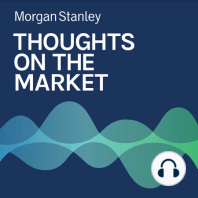4 min listen

Mike Wilson: The Final Chapter of the Mid-Cycle Transition?
Mike Wilson: The Final Chapter of the Mid-Cycle Transition?
ratings:
Length:
4 minutes
Released:
Sep 20, 2021
Format:
Podcast episode
Description
Although many commentators point to the S&P 500 near all-time highs as a rationale for higher stock prices, markets may be facing a bumpy road ahead.----- Transcript -----Welcome to Thoughts on the Market. I'm Mike Wilson, Chief Investment Officer and Chief U.S. Equity Strategist for Morgan Stanley. Along with my colleagues, bringing you a variety of perspectives, I'll be talking about the latest trends in the financial marketplace. It's Monday, September 20th, at 12:30pm in New York. So let's get after it. For regular listeners to this podcast our mid-cycle transition narrative is probably getting fairly repetitive. A strong narrative that makes sense is worth riding until the end, and we're not there yet. However, we do think we've entered the final chapter. To recall, the mid-cycle transition began back in March. Initially, it's a more difficult time for the average stock, while the higher quality stocks and indices hold up. Over the last six months that's pretty much exactly what's happened - small caps and lower quality stocks have underperformed the S&P 500 significantly. But now we're entering the final chapter and that's the time when the index starts to underperform the average stock. This happens because that's where investors have been hiding; and at this stage of the transition, investors can no longer hide from the reality of what the mid-cycle transition brings. First, we have a deceleration in economic and earnings momentum. On the economic front, the data has already rolled over pretty hard. While many are blaming the Delta variant for this slowdown in the economy, we think it's more about the payback in demand from a fiscal stimulus and recovery that was unsustainably strong earlier this year. Furthermore, because this recession and recovery were much sharper than normal, we should expect a greater deceleration in growth during the mid-cycle transition phase this time. Finally, due to the nature of this recession being centered around a health crisis, the fiscal support from the government was unusually strong. This led to very high operating leverage and profitability. The normalization means that we could see negative operating leverage for a few quarters as costs are layered back in just as top line growth slows. The bottom line: earnings revisions over the next few quarters will probably look relatively worse than the economic revisions of late. The other headwind for markets that comes at this stage of the mid-cycle transition is the Fed moving away from maximum accommodation. In the 1994 and 2004 versions, the Fed began hiking interest rates. In the 2011 mid-cycle transition, the Fed simply let quantitative easing expire. This time around it's the tapering of asset purchases and we think the Fed will signal that more definitively at this week's meeting. In short, financial conditions should tighten and that means higher interest rates, higher risk premiums or both. Either one means lower equity valuations, which is really the key part of the final chapter of the mid-cycle transition. Once that derating is complete, we can then move forward to the mid-cycle phase, which usually leads to a reacceleration in growth, a broadening out of stock performance and higher equity prices. So how bad will it get? We've been suggesting a 10-15% correction in the S&P 500 is inevitable once we get to the final stage. However, given how long this has taken to play out, the drawdown could end up being closer to 20% if the growth slowdown ends up being worse than normal. In 2011, we had a 19% drawdown, so it's not unprecedented. Therefore, we continue to think investors should hunker down a bit more than normal and skew portfolios toward defensive quality rather than large cap growth quality. Of course, markets can surprise us, which begs the question, what could change our view and allow the S&P 500 to avoid the 10-20% drawdown? First on the list is another fiscal stimulus directed right at the consumer that sustains the w
Released:
Sep 20, 2021
Format:
Podcast episode
Titles in the series (100)
Mike Wilson: Weighing a Potential Fed Rate Cut by Thoughts on the Market